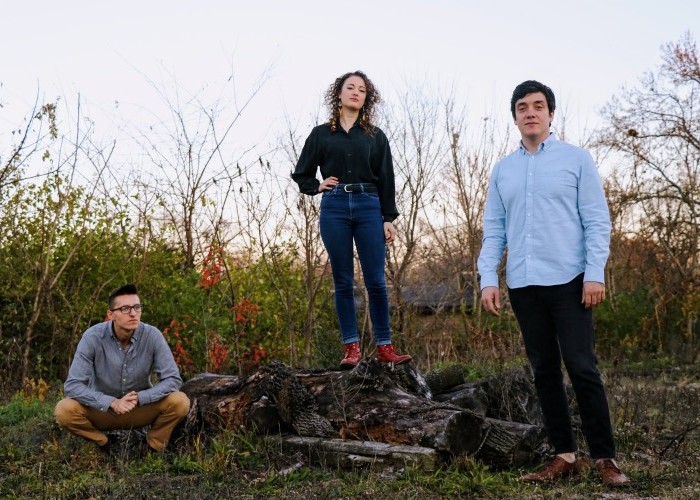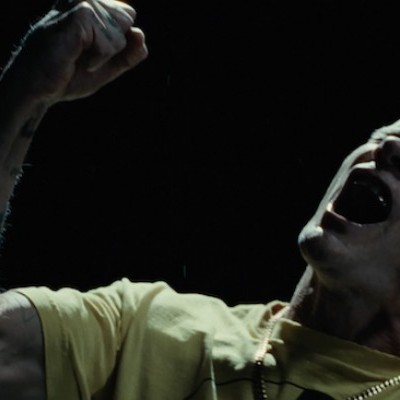Dec 9, 2025 12:28 PM
In Memoriam: Gordon Goodwin, 1954–2025
Gordon Goodwin, an award-winning saxophonist, pianist, bandleader, composer and arranger, died Dec. 8 in Los Angeles.…

Drummer Rocky Martin (left), bassist Hannah Marks and tenor saxophonist Barclay Moffitt perform as Heartland Trio.
(Photo: Hannah Boomershine)Des Moines, Iowa-born bassist Hannah Marks, a senior jazz studies major at the Jacobs School of Music at Indiana University, decided on her musical path while still in middle school. And in 2017, the bassist/vocalist founded the Heartland Trio with tenor saxophonist Barclay Moffitt and drummer Rocky Martin.
Self-professed fans of folk, garage, punk and hip-hop, the ensemble released its debut, Year One, in 2018. Dates for the band’s upcoming tour, which runs May 8–17, can be found on its Facebook page.
To get the backstory of the trio’s first recording, DownBeat spoke with Marks while she was in New York during her “first trip exploring the city as a jazz musician,” performing with saxophonist Ben Wendell as part of a quintet from her school.
The following has been edited for length and clarity.
It’s not every day that an adolescent decides to become a jazz musician. How did that happen?
My parents had a great jazz collection—-we grew up with Kenny Burrell, Carmen McRae, Coltrane, Miles. So, we had all those records and it was in my mind. Then I started working on jazz and I was attracted to it, because it seemed like the most virtuosic thing I could do on my on my instrument—instead of studying rock, because a lot of younger people, they’re going to be playing in a rock band, so they study the electric bass. And then as I was about to enter my freshman year of high school, I went to a jazz camp, and that’s really when I fell head over heels for the music.
And there’re also folk and spiritual influences in your music?
Actually, around the same time I went to that jazz camp, one of my instructors at the camp also played in my local church band; this is the church that I had grown up with, and I ended up joining that band as a freshman in high school, and we basically did bluegrass and folk versions of all these hymns and spirituals. So, that really influenced me.
The Heartland Trio has been described as “garage band” jazz. How’d that come about?
That’s my third stream of musical influence. Around that same time, I had some friends that were playing in these amazing punk bands, and I got really into it. I never played in a punk band, but I always really wanted to. I just loved going to shows. I would go to these early shows that were for under-21-year-olds at these dive bars and join the mosh pit. That energy, that rawness, and also the tightness of the bands really influenced me.
Your bass playing is hardly harsh, but it does seem to contain a more raw, direct energy.
I would agree. I think I can recall the first time someone told me to pull harder. I was in jazz band in eighth grade and this woman, Susie Miget—she was sort of the “mother” of Iowa jazz—came to watch me do rehearsal, and she was like, “You sound good, but I can’t hear you. Pull harder, pull harder!” And that really stuck with me.
After that, I always wanted to make sure I was heard. But I also figured out that it wasn’t necessary to just turn up the amp; there’s a lot to be said for really digging into the instrument. So, that’s really the most important thing to me, my sound, how big the sound is, how woody it is.
Any particular punk or garage rock band you would name as an influence?
I love anything from the ’80s and ’90s; sort of underground or grunge stuff. Bands like The Melvins ... I love R.E.M., I love The Lemonheads. I’ve also been fortunate to be a teaching assistant for history of rock ’n’ roll classes for the past two years at Indiana University. So, I’ve been able to sit in on all their rock ’n’ roll classes and add to my musical background.
And what is there of the “heartland” in the Heartland trio?
It’s definitely the folk and the rock element—-sort of a signature of things from the Midwest. As much as we are influenced by black American music, there’s sort of a different stream that’s come into play just by virtue of being in the Midwest and not necessarily being around an urban center. And again, that’s reflective of our own individual backgrounds: I would say the folk and rock background is really mine. But for example, Barclay comes from more of a hip-hop background, so it really sort of fuses together in the end.
And you add vocals, but not words to your pieces. Tell me more about that choice.
I’ve always loved to sing, and we’ve slowly been adding more vocals into Heartland Trio’s works. But I realized recently that I’m not really interested in sounding like a lead singer or even a traditional jazz singer. I really would just love to sound like another instrument. When we started composing, I felt like I could only write for three voices and that was only three instruments. And then, as my composition skills have developed more and more I’m hearing a fourth voice, and I think, “Let me write something I can sing.”
It’s a lush sound without being heavy-handed.
I can’t claim to call myself a vocalist by any means; I just love to sing. And if there’s any way that I can add to the musical texture, that’s really what I’m trying to do.
Speaking of textures, what kinds are you trying to create for the trio?
We’re definitely interested in in expanding the role of the chordless trio, exploring how we can add and work on new sounds together. So, maybe it doesn’t even sound like there’s only three people. Sometimes I’m doing that by using my bow, or Barclay—it always blows my mind, maybe this is a typical saxophonist thing—he screams through his sax. And Rocky can add lots of different percussion toys, and I’m just adding some floating singing on top. It really expands the trio sound.
And expands the notion of jazz, too, while you’re at it.
Yeah, exactly. DB

Goodwin was one of the most acclaimed, successful and influential jazz musicians of his generation.
Dec 9, 2025 12:28 PM
Gordon Goodwin, an award-winning saxophonist, pianist, bandleader, composer and arranger, died Dec. 8 in Los Angeles.…

Belá Fleck during an interview with Fredrika Whitfield on CNN.
Jan 13, 2026 2:09 PM
The fallout from the renaming of the John F. Kennedy Center for the Performing Arts to include President Donald…

The success of Oregon’s first album, 1971’s Music Of Another Present Era, allowed Towner to establish a solo career.
Jan 19, 2026 5:02 PM
Ralph Towner, a guitarist and composer who blended multiple genres, including jazz — and throughout them all remained…

Flea has returned to his first instrument — the trumpet — and assembled a dream band of jazz musicians to record a new album.
Dec 2, 2025 2:01 AM
After a nearly five-decade career as one of his generation’s defining rock bassists, Flea has returned to his first…

Rico’s Anti-Microbial Instrument Swab
Jan 19, 2026 2:48 PM
With this year’s NAMM Show right around the corner, we can look forward to plenty of new and innovative instruments…